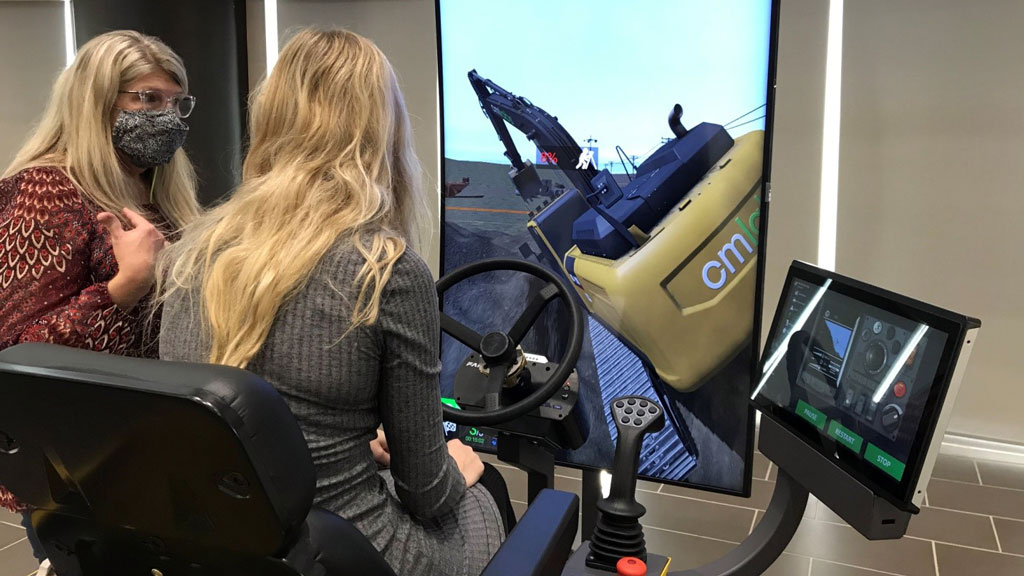Southeast College is looking to acquire eight new heavy equipment simulators to launch a new heavy equipment operator program in Estevan, Sask., in spring 2021.
In September, Southeast College issued its initial funding announcement of $100,000 from the Government of Saskatchewan, Estevan MLA Lori Carr and the Provincial Transition Funding Committee for Economic Development for the new program. In addition, the college has acquired from the Government of Canada’s Western Economic Diversification Canada program $800,000 to help establish the program.
The program is open to anyone across Canada but will intake only eight students at one time. The program is still tentative, said Jody Holzmiller, vice-president of education and training for Southeast. “We are currently not taking registration,” she said, until the final curriculum has not been determined but students interested in the program can submit their names by emailing heo@southeastcollege.org. They will be notified when the curriculum, price, and start-date are finalized, she said.
Holzmiller said the curriculum work underway is focused on providing a Southeast College program that reflects extensive consultation with industry carried out to address shortfalls in training and workplace safety and workplace life skills that can occur when individuals enter this field.
Holzmiller said one immediate concern is a misconception that comes with heavy equipment operator programs. She is currently considering modifying the name of the heavy equipment operator program to better reflect the skill levels of emergent students. There is often the assumption that those graduating a 12-week course are skilled operators of heavy equipment. “In fact it takes many, many hours of experience (in the work place) to reach the level where they can be considered skilled,” she said.
She is also looking at the program cost as such programs are expensive to run and come with a hefty tuition fees – approximately $10,000 – for a 12 week course. She is attempting to find ways of bringing the cost down. The course material the college is hoping to provide will consist of classroom training, training on simulators, and infield training working on real equipment.
Holzmiller sees simulators as providing a number of advantages and wants each of the courses’ eight students to have a simulator. “We are looking at introducing simulators after again consulting extensively with industry,” she said.
“They allow us to offer more in-seat training,” she said, adding in-seat training on real equipment is expensive to provide and simulator training can provide students with greater confidence and more muscle memory before climbing into the cab of a piece of equipment that can cost up to $750,000.
Southeast College acquired a simulator on loan for a demonstration and personnel at the college were impressed with the results. She said trained operators tried the simulator and were surprised a how realistic the experience seemed.
Each simulator can replicate the experience of operating a dozer, backhoe, excavator, crawler crane, forklift and articulated dump truck and wheeler loader and grader and can also simulate weather conditions such as rain and snow or night-time conditions.
“There is also virtual reality – you can walk around the equipment – and do a safety check, which is a very important part of operating heavy equipment,” she said. The simulators can also be hooked together so that two pieces of equipment. The simulator situations are based upon active job sites which show moving equipment and people walking around the work area.
While simulators will produce greater in-seat training, Holzmiller said the course is also attempting to provide a more knowledgeable and valued worker to industry.
“In consultation with industry, we asked what skills were missing from students,” she said. The industry wanted to see, as a minimum, the required workplace safety training. As well, student math skills often required by operators and the course will provide some upgrade of these skills. She said job readiness, how to be a good employee, learning to budget, and showing up on time, are all aspects that will also be taught to students. “The rest of the time (in the classroom) will be learning theory of different pieces of equipment, and the in-class time on simulators,” she said. The students will then go out in the field to work for a short practicum.
She said the course will provide an entry path for women who want to work in heavy equipment operations and is also expected to draw in First Nations students.






Recent Comments
comments for this post are closed